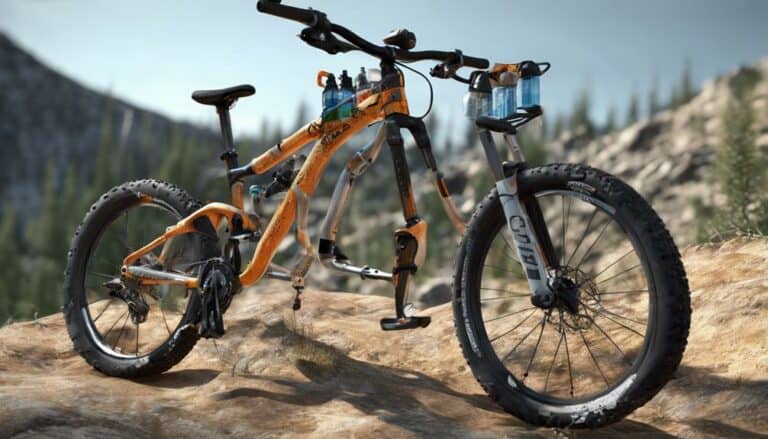When it comes to off-road biking, the weight of your gear can be like the unseen hand guiding your journey through rugged terrains. Picture yourself pedaling through winding trails, feeling the subtle difference in your bike's responsiveness as you navigate each twist and turn.
But have you ever wondered how the weight of your gear impacts this experience? Stay tuned as we explore the intricate relationship between gear weight and off-road biking performance, uncovering insights that could elevate your rides to new heights.
Key Takeaways
- Gear weight impacts acceleration, climbing ability, and overall performance.
- Heavier gear challenges agility, while lighter gear enhances efficiency and control.
- Managing gear weight is crucial for endurance, comfort, and biking enjoyment.
- Balancing gear weight optimizes handling, reduces fatigue, and boosts trail performance.
Impact of Gear Weight on Cycling Efficiency
Gear weight greatly influences the efficiency of off-road cycling performance, impacting acceleration, climbing ability, and overall energy expenditure during rides. When your bike is loaded with heavier gear, you'll find it more challenging to accelerate quickly and tackle steep climbs on off-road trails. The added weight increases the energy you need to exert, especially when managing technical terrains and inclines.
On the flip side, reducing gear weight can enhance your agility and control, essential for smoothly handling through rugged landscapes.
Managing the weight of your gear is vital for maintaining endurance and comfort during long off-road rides. Heavier loads can lead to quicker fatigue, diminishing your overall performance over time. By optimizing your gear weight, you strike a balance between efficiency and comfort, ensuring a more enjoyable biking experience.
Weight Considerations for Off-Road Biking Gear
When contemplating off-road biking gear, the weight of your equipment plays a vital role in determining your performance on challenging trails. Here are three key weight considerations for off-road biking gear:
- Climbing Performance: The bike weight, along with the weight of your gear, directly impacts your climbing abilities. Lighter gear allows for easier ascents, reducing the strain on your muscles and improving overall climbing performance on steep and rugged trails.
- Maneuverability and Fatigue: Carrying heavy gear can hinder your maneuverability, making it harder to navigate through technical terrain. Additionally, the extra weight can lead to quicker fatigue, affecting your endurance and concentration on longer rides.
- Acceleration and Energy Expenditure: Heavy gear not only hampers acceleration but also increases your energy expenditure. By opting for lighter gear and implementing weight reduction strategies, you can enhance your acceleration, conserve energy, and ride more efficiently through various off-road conditions.
Considering these factors and focusing on weight management can significantly impact your off-road biking experience, allowing for better performance and enjoyment on challenging trails.
Performance Effects of Heavy Gear on Trails
Heavy gear on off-road trails greatly impacts rider performance and endurance due to increased weight and strain on the body. When biking with heavy gear, the added weight can affect various aspects of your off-road experience. Here is a breakdown of how heavy gear influences performance on trails:
| Aspect | Impact |
|---|---|
| Acceleration | Slower due to the increased weight, making it harder to quickly pick up speed |
| Agility | Reduced agility when navigating technical terrain as the added weight affects handling |
| Endurance | Decreased due to the additional strain on the body from carrying heavy gear over long distances |
| Fatigue | Increased as the body works harder to compensate for the added weight, leading to quicker exhaustion |
| Maintenance | Higher potential for bike component strain and wear, requiring more frequent maintenance |
These effects highlight the significance of considering gear weight when planning your off-road biking adventures. Opting for lighter gear can not only enhance your performance but also make your rides more enjoyable and sustainable in the long run.
Optimizing Off-Road Biking With Lighter Gear
In optimizing off-road biking performance, reducing gear weight greatly enhances rider endurance and agility on challenging trails. Lightening the load on your bike can make a significant difference in your overall cycling experience. Here's how lighter gear can positively impact your off-road biking adventures:
- Faster Speeds: By choosing lighter gear, you can increase your speed on trails due to reduced resistance and improved power-to-weight ratio.
- Improved Agility: Lighter gear allows for quicker maneuvering and better handling, enhancing your ability to navigate obstacles and tight turns with ease.
- Enhanced Efficiency: Opting for lighter gear decreases the energy required to pedal, leading to improved efficiency and longer ride times without feeling fatigued.
Reducing the weight of your gear not only boosts your speed and agility but also contributes to a more enjoyable and liberating off-road biking experience.
Balancing Gear Weight for Better Performance
To optimize off-road biking performance, achieving a balanced gear weight is essential for enhancing handling and maneuverability on challenging trails. When lightening your gear load and minimizing weight, you reduce stress on both yourself and your bike components, leading to enhanced efficiency. This stress reduction allows for improved responsiveness, making quick direction changes easier on demanding terrains. Maintaining a well-distributed gear weight is key to ensuring stability and control while riding off-road. By balancing your gear weight effectively, you not only prevent fatigue but also boost acceleration, ultimately enhancing your overall biking experience. To illustrate the importance of balancing gear weight, consider the following table:
| Benefits of Balancing Gear Weight | |
|---|---|
| Optimize handling | Minimize gear weight |
| Enhance maneuverability | Improve responsiveness |
| Reduce stress | Enhance efficiency |
Conclusion
To summarize, the weight of your gear is like the wind beneath your wings, propelling you forward or holding you back in off-road biking.
By choosing lighter gear, you can soar effortlessly through challenging terrains, while heavy gear can weigh you down like an anchor, hindering your performance.
Remember, the right balance of gear weight is the key to unleashing your full potential on the trails.
Ride smart, ride light, and watch yourself fly.

